Nigel Bird's Blog, page 53
May 27, 2013
One Man's Opinion: ONION STREET by REED FARREL COLEMAN
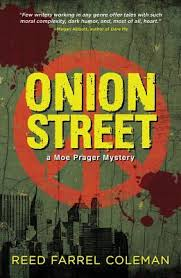 I like the idea of a prequel when it relates to something I really enjoy. Private Investigators certainly come into that category. The next book on my list is ‘A Drop Of The Hard Stuff’, where I hope I’m going to find out a little more about one of my favourite characters, Lawrence Block’s creation Matt Scudder.
I like the idea of a prequel when it relates to something I really enjoy. Private Investigators certainly come into that category. The next book on my list is ‘A Drop Of The Hard Stuff’, where I hope I’m going to find out a little more about one of my favourite characters, Lawrence Block’s creation Matt Scudder. This time around it was another New York detective, Moe Prager, who I was getting to know better. As well as the similarities between Prager and Scudder, there are also big differences. Prager is from Brooklyn and he’s Jewish, which are 2 aspects of his being that make him very distinctive.
In ‘Onion Street’, Prager sits with his daughter and tells her about how he became a cop.
We know early on that it has something to do with his best friend in college, Bobby Friedman, and that there’s going to be plenty to tell. In part, his thought processes relate to ‘what might have been’ if life hadn’t followed the path it did.
Bobby Friedman is the son of a radical, communist, immigrant family. He’s the exception among a college crowd who have been politicised by America’s role in Vietnam and the possibility that they might be drafted in that he’s very much into free enterprise, dabbling here and there in anything that will make him money.
On the night that Moe bails Bobby out of jail (due to suspicions about the death his girlfriend), Moe finds his own girlfriend (Mindy) in a terrible state. The only things he can get from her are sex and a warning to stay away from Bobby.
The next day, a car attempts to kill Bobby and it’s a good job for him that Moe has ignored Mindy’s warning.
Before Moe can get to the bottom of things, he finds out that Mindy is in a coma having been attacked in the street.
The warning she gave him and the unusual string of events leave Moe desperate to find Mindy’s attacker and also to find out the truth.
As he investigates, he becomes entwined in business that is extremely dangerous. People around him seem to get hurt or killed as he follows his instincts and each open door leads him into a darker and more sinister corridor. It’s not long before his own life is in jeopardy and he has to rely on his street-smarts to help him get through his speedy transition to adulthood. Unfortunately for him, his street-smarts aren’t quite what he thought they were:
“You grow up in Brooklyn, you like to think you’re tough, that your skin is thick and concrete hard and that you come out of the womb all grown up and prepared for anything life can through at you; [but] I wasn’t any tougher or any more prepared for the darts life throws at you than a Kansas farm boy.”
Getting to know Moe in his early years is often a treat. He’s feeling his way the best way he can and his decisions aren’t always as sensible as his older self might make. This does create a slight difficulty for author and reader in that young Moe needs to go through long thinking processes from time to time, and this sometimes has a circular feel to it. It does also lead to several incidents where the reader seems well ahead of the would-be detective. That said, we’re not in the hands of the protagonist but in the care of a skilled author and the way the labyrinth has been built and then navigated keeps things moving along pretty nicely.
As the plot twists and turns, any sense that there might be a predictable ending to the book has gone and all bets on working what might happen are off. What I can tell you is that Moe sticks to the task admirably and it’s clear that he’s a natural.
There’s a lot to enjoy here. I love the little Jewish asides which are inserted to add a strong flavour to the piece. I also really like the sense of Brooklyn and what it might have been in 1967 and it does feel like it is a crucial element to both this story and to Moe’s future. It’s also fascinating seeing a young man start off on his journey into police and detective work, especially when this path emerges so organically from circumstance.
It’s a book that many Moe fans will enjoy. It’s also one that newcomers might find interesting and, in case they don’t already know, there’s a lot to come if they become hooked. Onion Street may not be my favourite Moe Prager investigation, but I'm more than glad I joined him on this journey.
Published on May 27, 2013 12:00
May 23, 2013
One Man's Opinion: A FEAST OF SNAKES by HARRY CREWS
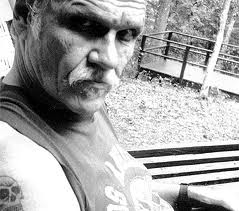
First off, a big thanks to Rory Costello for yesterday's piece. If you didn't see it, I recommend that you scroll down and check it out. I'd also thank Rory for suggesting this book to me as something I might enjoy; as always, he was bang on the money.
A Feast Of Snakes is a stunning novel.
It’s set in Mystic, Georgia during the build up to a Rattlesnake Roundup that’s become a little too successful for the small town to handle.
Joe Lon Mackey is an ex-football player whose career is over at a young age. To take the edge off his sense of failure he’s turned to the bottle and still tries to maintain his top-dog status in the area.
He has a hard-nosed father (Big Joe Lon) who has a talent for dog-fighting, a damaged sister who stays in bed all day watching TV, a sheriff friend who likes to play with young girls, a saintly wife and two children and a hot lust for an ex-girlfriend who has returned to Mystic from college.
The opening at a football game is full of energy – sexual, violent and disturbing – and pregnant with the bizarre. It’s clear from the off that this book is going to be out of the ordinary and that understanding is powerfully underlined as it continues.
There are some very strong elements that a reader can hold on to. There’s the subtle depiction of racial relations and the way people work within the boundaries of time and place. There’s an existential slant to the examination of purpose and the implications of losing direction whether that be through age or accident. There’s a view of the power within relationships on a small and larger scale and that damage that can be done when power is the only tool one has in the box. There are thoughts on madness and the thin ice that we all tread upon. We also get to see the extremes of complete control and absolute anarchy and the dangers of each extreme.
The plot is a gently meandering one is some ways. I read the book slowly even though there was a page-turning element to the writing that might have had me jumping on to find out what was about to happen. Taking my time seemed important as there’s so much to savour. In tone the words and the dialogue seem simple, yet there’s a wonderful subtlety to it all that means it might be better not to miss the gems on each page by rushing.
I was really struck by the parallels between the old dogs coming to the end of their fighting lives and Joe Lon. They’ve all been bullied by Big Joe in ways that no creature should be. It might be that Big Joe feels this is the right thing to do, but his clarity is hugely misguided. The fates of the dogs and the son are sealed and have been for a long time; it’s a shame none of them had other strings to their bows.
The dog fighting and training scenes are fully developed and hard-hitting. They’re gritty as they could be. I’m pleased I only read this after writing ‘Smoke’ otherwise I may not have felt up to the job.
There are also a couple of scenes and situations of bullying that are so profound as to be hugely disturbing. What Crews does here is rather special. Instead of laying the violence and the harshness of the acts of cruelty bare with no supporting frame, he manages to bring out a huge empathy with the victims. Whether it’s Lottie Mae suffering under the sheriff’s weight or Joe’s wife putting up with the most humiliating treatment or the retired salesmen who runs into the wrong people at the wrong time, they’re all flinchingly well-written.
The book really struts to its conclusion and feels like it has put on many pounds of muscle along the way. By the end it has the strength of a powerful beast and, like Goliath, there’s only one way for the beast to go.
There’s a line early on from cheerleader Hard Candy as she feeds a rat to a snake that puts me in mind of what Crews can do to a reader: ‘Nobody’s going to hurt you, little rat. We just gone let the snake kill you a little.’ Be warned.
This was my second read of a Harry Crews story. The first time around, I really didn’t manage to get beyond the beauty of some of the prose. A Feast Of Snakes is something else altogether and now, at last, I can see why the author is so widely hailed as a talent and a huge influence upon more contemporary writing.
Published on May 23, 2013 02:07
May 22, 2013
Grandfathers Of ''Brit Grit'' by Rory Costello
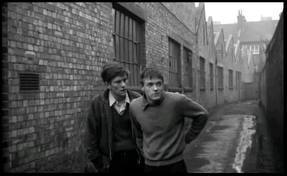
“What the hell is Brit Grit?” Paul D. Brazill posed this question last fall in order to present a long roster of high-quality British crime fiction writers who are active today. He’d published the piece a couple of times before, including this version in 2011 with “an addendum of worthy Brit Grit authors” – among them our host, Nigel Bird.
Paul wrote, “The godfathers of the new Brit Grit could well be Ted Lewis, Derek Raymond and Mark Timlin.” These were all new names to me, but upon investigation, a hunch of mine turned out to be accurate. After reading Nigel’s In Loco Parentis last year, I considered him to be an heir to a British literary tradition: the works of Alan Sillitoe, John Braine, and others from the late 1950s and early ’60s. Indeed, there’s a clear line that runs from those so-called “Angry Young Men” down to the current generation, through Lewis in particular.
Another author in Paul’s list, David Peace, helped connect the dots. Peace, who grew up in West Yorkshire, talked to Matthew Hart for the 2006 work Immigrant Fictions. He said, “To read John Braine, Stan Barstow, David Storey, Alan Sillitoe, and Barry Hines, and later Ted Lewis and Derek Raymond, was very empowering and inspiring for me – reading about places I knew in language I heard and spoke every day.”
The bleak backdrop of industrial Northern England was essential to the grittiness of those works from that decade or so before “Swinging London” came into vogue in the mid-1960s. It’s also a prime element in much of today’s Brit Grit. And even though crime wasn’t the focus of the earlier authors, it’s an undercurrent, most visible in the borstal boy anti-hero of Sillitoe’s The Loneliness of the Long Distance Runner.
Sillitoe himself acknowledged this in the final interview he gave before his death in 2010. The interviewer noted, “A lot of your characters escape the humdrum of their lives through petty crime or heavy drinking. Presently, Nottingham has a bad reputation for both, not to mention gun crime. Do you think your stories have contributed to this myth?” Sillitoe replied, “I don’t know really. I mean this type of crime you get now is nothing like the kind of crime the people I knew when growing up would ever perpetrate. We wouldn’t dare. I wrote before the druggy era…”
Yet despite this crucial difference, Sillitoe et al. paved the way for decades to come. Two more Brit Grit authors of the 2000s, Cathi Unsworth and Martyn Waites, showed just how strong the connection was in this interviewthey did with each other. “Cookie” – as they referred to Robin Cook, for whom Derek Raymond was a pen name – was an enormous influence on both. He was personally responsible for making a crime fiction writer of Unsworth, who asked Waites in turn about the impact of Cook, as well as Northern writers such as Sillitoe, Barstow, Keith Waterhouse, and Lewis.
Waites underscored Cook’s importance, though in contrast to Peace, he said that he came to the others retroactively. He also said, “It’s interesting you touched on Sillitoe, et al., because they’re writers who are noted for creating fiction that examines society from the bottom up. And that’s the way I think crime fiction – at least good crime fiction – is headed.” He also added, “I think place is vitally important” – Waites focuses on Northern settings – and noted strong echoes of where and how Lewis worked in his own writing.
Cook/Raymond was an upper-class Londoner who came to know and write about that city’s underbelly. Mark Timlin, another Southerner writing about London, took his primary influences from American noir fiction. There’s little evidence of any direct imprint on either from the “Angry Young Men.”
There’s no doubt, though, of the ties between Lewis and Sillitoe, Braine, Storey and Co. Brian Greene, who has written a number of articles about Lewis, discussed the Northerner’s shiftbetween the crime genre and “literary” works. Lewis made his reputation with Jack’s Return Home, the basis for the highly influential film Get Carter. Yet “Lewis returned to the literary fiction milieu with 1975’s The Rabbit, a coming-of-age novel…done in the vein of gritty Brit kitchen sink dramas like Saturday Night and Sunday Morning, Room at the Top, This Sporting Life, The Loneliness of the Long Distance Runner, etc.”
In another piece, Greene noted that Lewis’s first novel (an unsuccessful 1965 effort called All the Way Home and All the Night Through), was also written in the “Angry Young Men” vein. Of particular interest in that article, however, was Lewis’s passion for the cinema. Here too the influence of the “kitchen sink dramas” is visible – this was one of the finest periods ever for British film. Directors such as Tony Richardson, Karel Reisz, and Lindsay Anderson translated the literature brilliantly to the screen. In fact, in a 1999 article, journalist Vanessa Thorpe wrote about a revival of “the hard-bitten tradition of social realism…launched on the back of pictures such as Saturday Night and Sunday Morning, A Kind of Loving, and This Sporting Life.” The term she used? “Brit-grit.”
Published on May 22, 2013 02:57
May 8, 2013
One Man's Opinion: THE KIND OF FRIENDS WHO MURDER EACH OTHER by CHRIS RHATIGAN
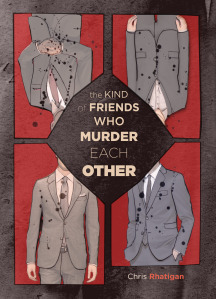
There are a number of writers out there who are playing with noir fiction and bending and shaping it in new ways. Think John Rector, Eric Beetner or Heath Lowrance. If they’re writers you dig, you should add Chris Rhatigan to the list. He has his own style and that comes to the fore in ‘The Kind Of Friends Who Murder Each Other’. Truth be told, I was bowled over by the end of the first chapter; from then on he just kept on hurling the balls at me and his characters until things had to end. This book is taut, strong and put together like an old classic. Don’t miss out.
You can pick it up for free over at Smashwords or as a very cheap to buy paperback over at Kuboa.
Published on May 08, 2013 04:02
May 2, 2013
One Man's Opinion: THE WATCHMAN by ROBERT CRAIS
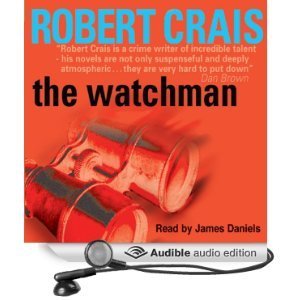
I’ve been struggling to read of late. In fact, I always struggle to read to some extent. To make it worth the effort of revisiting lines and sentences that haven’t made sense, I have to be really engaged.
An audio-book seemed like a good thing to try as an alternative. I get to drive to work 2 or 3 times a week and have a CD player, so why not?
This isn’t the first audio-book I’ve tried. I’ve experimented many times in the past, but generally have found them a little frustrating. Apart from anything else, there are always those stutters and echoes that come with the territory – no doubt that comes from the ever-increasing number of pot-holes in our roads.
Anyway, I set off to Tranent last week to The Watchman by Robert Cray, read by William Roberts.
The story opens pretty slowly and in a fairly run-of-the-mill way.
A rather annoying rich girl is involved in an accident. Before long the FBI are interested because the girl identifies a dangerous killer as one of the passengers in the other car.
Not long after that, it seems that Larkin’s life is in jeopardy. That shouldn’t be a concern to a very wealthy father, only the first couple of safe-houses set up by the FBI under the protection of Bud are attacked by men aiming to kill Larkin.
In steps Joe Pike at the behest of the Bud. This pair has a history going back to Pike’s early days in the LAPD. It’s a history that is explored as the book unfolds and becomes a very satisfying strand of the novel.
The play is now that Larkin is under Pike’s protection.
They move to another safe house, one of Bud’s own. It should be perfectly safe, but it’s not long before they’re attacked and Pike is able to demonstrate some of his almost super-hero like abilities.
Pike and Larkin have little in common, or so it seems, and Pike’s insistence that they do things on his terms mean that the pretty little thing he’s protecting really has to slum it for a while.
It’s fairly ordinary up to this point.
I also found the narration to be a little strained. Some of the intonation jarred and the need to take on the voice of a gruff male and a teenage girl is quite a stretch.
There was also an element of repeating information just to make sure I’d got it as the listener that seemed a little heavy for me; a little more subtlety might have helped me here.
In spite of any reservations I stuck with it. The story had enough juice to keep me interested and I’m so glad I didn’t give up.
It’s not long after this that the plot thickens.
Elvis Cole comes into play, forensics at the LAPD, fraudsters, Mexican gangs, terrorists become part of the plot and it thickens up like perfectly made custard.
Best of all is Pike and his need to move forwards. Even when he’s wrong, there’s only one way.
As he does his job, his relationship with Larkin gels. They soften towards each other. The story develops into a rather splendid buddy tale. As each of the pair let their guard down, I got to know them more that I might have imagined. They even get to know each other in a way that seemed impossible at the off. It’s superbly done.
All the while, as things grew more complex and more gripping the narrations also became familiar. The jarring had gone and instead I found things to be smooth and silky – I guess that’s when a reader has done a good job.
By the end of the first week of commuting I had to bring the discs into the house. They’ve replaced the TV in the evenings and accompanied me as I’ve done the housework.
Pike's a great character. He has some of the hardness of Jack Reacher, but is far more human, believable and likeable.
It’s a very enjoyable book and a very satisfying listen.
I’ll be back for more audio-books and I’ll definitely be picking up more Robert Crais.
Published on May 02, 2013 04:38
April 30, 2013
One Man's Opinion: RUMBLE FISH by SE HINTON
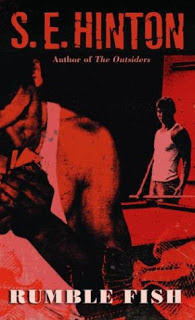
Things in life don’t come with equal weight. The biggest and heaviest impacts are when an event or a moment grab a life that is completely and utterly ripe for something it didn’t know existed.
The film Rumble Fish was one of the big blows of my early adulthood. To me it was (and still is) mind-blowingly good. The cast, the themes, the black-and-white and The Motorcycle Boy, Tom Waits raising his middle finger and chewing gum and an ending capable of knocking out a cinema full in the one go.
What I didn’t realise at the time was how much it had stayed true to the book.
I honestly don’t know why I didn’t think of reading it earlier. As with The Outsiders, I think it had something to do with the Young Adult tag; even though that’s what I was at the first viewing of each film (Rumblefish at the Scala cinema in London’s King’s Cross and The Outsiders on video in my family home).
Wasted years, I can tell you.
The first thing that struck me about Rumble Fish (the book) was the power of the opening chapter. It’s nigh-on perfect I’d say. Sets the scene, hooks the reader, gives the voice and explodes into action in a way that’s laid back and almost lazy – I know that laid-back and explode contradict each other, but that’s how it feels – I guess that a slick car with great gears and engine might do this as it accelerates, fast as hell yet so smooth the motion is hardly felt.
After reading those first few pages, I had to pause for a couple of days just to think about it.
The next thing that hit was the way that the movie of the book had stuck so closely to the dialogue (it’s practically verbatim). I loved reading lines that I’ve been carrying around with me for years:
“Even the most primitive societies have an innate respect for the insane.”
“Loyalty is his only vice.”
“The Greeks got her.”
“California is like a beautiful wild kid on heroin, high as a kite and thinking she’s on top of the world, not knowing she’s dying, not believing it even if you show her the marks.”
Winners all. And there are so many more.
The story itself is brilliant. It’s everything I want from a book. The characters are so well drawn and the setting and the plot are great. It holds an incredible romance for me, a nostalgia for something I didn’t really experience, the kind of nostalgia I felt with books like The Great Gatsby and the like.
I love the idea of people being born in the wrong age (I swear I know a few of those) or in the wrong place (ditto). The sense of heroes and idolisation reminds me of my own idols. The relationships are dysfunctional in a way that’s almost caricature but maintain love at their core. Time flies, life is short, people are different, we have dreams and nightmares, we’re all products of our genetic mix and our realities.
As far as I know, this book is studied still as a modern classic in the US. I can see why that is – if I ever write anything as good, I’ll have achieved all I ever wanted to with my work.
I can also see why this might attract the odd detractor. Too simple they might say. Too unreal. Too pretentious. Too whatever they feel it’s too much of. Whatever it is, they might be right, but then again, maybe they just didn’t read it at the right moment or in the right place.
To me, it’s just brilliant.
And I still want to be The Motorcycle Boy even though I get nervous as a passenger on a scooter as soon as it racks up 30 miles per.
Read this one I say. Read and weep.
Published on April 30, 2013 14:38
April 26, 2013
Dancing With Myself: KARIN COX interviews KARIN COX

"Are YOU talking to me?"
Q.1 So, what's up with the talking to yourself? I mean, we all do it a little bit, but to interview yourself ... got a few "personality" issues have you?
Me? Never! I'm a writer. I have way more than a few issues. To start with, there's this vampire-hunting Cruxim who keeps rattling around inside my brain and falling for the wrong women, particularly those who are half lioness. And when he's not bugging me and convincing me to leave the house-cleaning and just finish one more chapter, there's a whole host of other fantasy characters falling in love, getting lost in museums, battling all manner of horrendous beasts, and sometimes learning something about themselves in the process. When they're done with me and I'm exhausted, a little snippet of poetry or the idea for a children's story might unexpectedly pop into my brain. And that's all while I'm awake. There is even more going on at bedtime, when I'm lying there trying to sleep. So you see, there's a lot happening up there. I almost have to talk to myself, or at least write it all down, just to stay sane.
Q.2 Sounds like it is never dull at your house. How do you find time to write?
With a toddler, finding the time to write is always a struggle. I snatch writing time while she naps, and I often stay up late to write in the middle of the night when everyone else is snoozing. I also use a program called Write or Die to make me focus and to just get the words on the page. If I don't meet my wordcount, it goes "Kamikaze" and starts to eats words before my eyes. It is a frightening but effective way to write.
Q.3 Tell me about your writing process. Are you a plotter or a pantser?
I always wear pants when I write, often pajama pants. Seriously, I am not a huge plotter. I find plotting everything out in rigid details makes me freeze. I prefer to know the beginning, the climax, and the end and then to work towards those three plot points, and if I take a slight detour at times and end up holding the map upside and wondering how the hell I got where I am, I just put it down to being adventurous and try to discover the breadcrumbs back to my original plot.
Q4. Are you telling me you actually turn maps around when you're navigating?
Um, yep. I have absolutely no spatial reasoning skills. I'm all imagination and very little practicality when it comes to shapes, numbers, and locations. My partner once called me, "The dumbest smart person he knows." (Me: And you won't ever let him forget that, will you? Me too: Not on your Nelly!) For a dumb smart person who struggles to navigate my way out of the house, I do have an exceptional memory — just not for directions.
Q.5. I hear you're from Down Under. No wonder you keep getting lost all the time, it's miles away! Tell me, have Aussies embraced the ebook revolution as much as Americans and Europeans have?
*Waving from the bottom of the globe* I don't think Australians have quite developed the taste for reading on ereaders yet, but I do think we're a growing market. With a good economy and a high dollar, I really think the next few years will see Aussie consumers exponentially leap on the ebook bandwagon. I hope so, at least. If not, I'll have to trade my car in for a kangaroo and start eating Koalas. (Readers *thinking*: Really? People ride kangaroos and eat Koalas in Australia? Me: No, don't be daft. Koalas are a protected species and taste like eucalyptus, and a kangaroo can kick a hole in your stomach. They may look cute and cuddly, like most Aussies, but don't be fooled. We're all hardcore down here. We have to be or the snakes would eat us).
Q.6. A little birdie (possibly a Kookaburra) also told me that you used to be an editor. Aren't editors just failed writers? What made you switch from editing to writing?
Actually, I've always written. I won my first award for writing poetry when I was just an ankle-biter. I got into editing some fifteen years ago, after studying English Literature & Communication Studies at university specifically because I wanted to work in an industry that would help with that dream. After editing for many different publishers in the UK and Australia, I took on a job as an inhouse author, writing natural history, Australiana, travel guides, social history, and children's fiction, but I always hoped that I might one day be able to make a go of writing fiction full-time. Mind you, the editor in me has often been responsible for making that dream difficult. I have enormous fear of failure lest I become that cliche: the failed writer. I still edit, but I'm just taking on fewer clients to try to focus on my own writing so that I don't let my own dreams pass me by while I'm helping other authors live their dreams.
Q.7 You write across so many genres, from non-fiction to Growth (poetry), Cage Life (short stories), and children's fiction Pancakes on Sunday and Hey, Little Sister, as well as Cruxim, which is gothic paranormal romance. Why not just stick to one thing?
Good question, and I've asked myself that a lot. (Me: Of course you have, you're me. Me too: Oh thanks, I forgot.) Basically, I just write whatever pleases me and takes hold of me at the time. I'm always beset by ideas, so when one burrows in and just won't let go, that is what I produce. I also have some more fantasy novels, a half-finished romance and a NA novel in the works. What can I say? I like variety.
Q.8. What advice would you give to authors who are just starting their self-publishing journey now?
Look and learn, and be professional. By that I mean pay for a great cover, an edit (at least one), and a formatter if you don't know the ropes or aren't willing to invest the time to learn. There is a lot of great information available in author forums and on blogs such as Dave Gaughran's or Barry Eisler's. You need to be your own marketer and publicist, too. Expect that, to begin with at least, you should pump any profits back into your business. And don't expect to be an overnight sensation: building a fanbase takes time and a little capital.
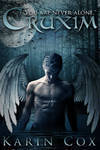 About the Author
About the AuthorKarin Cox edits and writes in her "spare time" while being a fulltime mum to a toddler and to a black cat with the improbable name of "Ping Pong."She is the author of more than 30 trade-published natural history books, biographies, Australian social history books, children's picture storybooks, and travel guides, several of which have won awards. Karin has had poems and short stories published in anthologies worldwide and her ebooks CRUXIM, GROWTH, CAGE LIFE, HEY LITTLE SISTER and PANCAKES ON SUNDAY are available on Amazon. Thankfully, the busier she gets, the more creative she is (and the more likely to afford to hire a housekeeper). Karin and her partner live in sunny Queensland, Australia, where she writes from her back deck overlooking the pool, her study (overlooking her messy desk) or her couch (overlooking Dr Phil). You can follow her on twitter @Authorandeditor or visit her fanpage on Facebook www.facebook.com/KarinCox.Author or sign up for her mailing list http://eepurl.com/vk_bP Also, feel free to email her at cruxim@hotmail.com.
Published on April 26, 2013 07:16
April 19, 2013
Frack Off
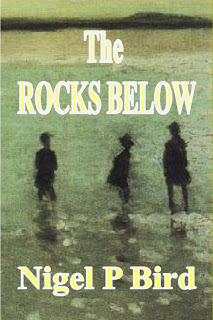
The Rocks Below is free today and until 21st April.
The strongest words you'll find inside are 'Frack Off' and that's because I'm hoping it will prove to be accessible to older children and get them thinking about one or two things.
It's had some cracking reviews so far, so check them out.
You can get it from:
Amazon uk
Amazon us
Amazon ca
and I'd be grateful if you could spare the time.
Many thanks.
Published on April 19, 2013 03:24
April 10, 2013
One Man's Opinion: THE SOUND OF LONELINESS by CRAIG WALLWORK
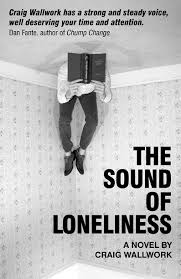 The words of William Blake are quoted at the beginning of this novel:
The words of William Blake are quoted at the beginning of this novel: ‘Dear mother, Dear mother, the Church is cold, but the Alehouse is healthy, and pleasant, and warm.’
It doesn’t take long to work out that this opening is very apt.
Daniel Crabtree is a barfly of sorts – more of a pubfly really. The pubs he frequents don’t have any of the dramatic or romantic connotations that one often finds in American fiction, rather they are down to earth places where men hide out and hang out and do little of interest other than drink.
Crabtree is a writer. He’s written one story – a short story which isn’t good enough to get into his local rag. Fortunately, he has only a loathing for those who can’t see his genius and is convinced of his abilities as an author and imagines his future to involve literary awards and high praise.
In order to help his prospects, he moves out of his family home to live a life where a living is barely scraped together. Hunger, he thinks, will be the carriage of his muse.
The thing about Crabtree is that he has a point in regard to his own talents. When telling his own life story or having to invent tales on the spot to get out of tight spots he has a real ability to entertain. The detail into which he goes is often a little further than one might want him to , but he relates events with a curious and honest perception as well as with a wonderful sense of dry humour.
He is full of tales about his drinking, illnesses, his tricks for making sure his benefits aren’t stopped, his miserable living conditions, his encounters with women, fellow drinkers and his description of Salford and they are all superb. Episodes with his dying uncle had me laughing out loud and drawing unwanted attention on the train and there were many instances where I couldn’t believe that the words used had actually been written down (these are brave words completely unshackled by Politically Correctness, words which sometimes seem chosen to stick up two fingers at aspects of modern Britain).
It strikes me as appropriate that this was the book I was reading at the time of Margaret Thatcher’s death given that the novel is set in a post-Thatcherite world where there was a lot of polarisation in many different ways.
There was a time when I thought I’d celebrate the Iron Lady’s passing. Thought I’d put on Costello’s ‘TrampThe Dirt Down’ and dance on an imagined grave. Having lost my own mother last year, I can’t find it in me to feel good about it – I guess I’m getting old – but there’s a little happy bubble inside that I’m suppressing just now and it’s an act of suppression that Crabteree just wouldn’t understand.
The snapshot that Wallwork offers of an ‘it’s grim up north (and in lots of other places)’ Manchester pre-regeneration is clear and crisp. It certainly took me back. I’d like to think that one of Thatcher’s legacies was to set in motion voices of protest and a whole gang of reactionaries who turned to creative outlets and ended up presenting us with such fine works as this.
In ‘The Sound Of Loneliness’ we have a well-written novel that has many strands and many strengths. It’s a book that tells an interesting and entertaining story and that kept me engaged throughout. It follows a series of excellent works from Craig Wallwork and, as I’ve said before, he’s a man to whom admirers of a whole range of fiction should be paying attention. The Sound Of Loneliness should be bought and from the following outlets:Kindle - Amazon.co.ukKindle - Amazon.comPaperback (with a really nice feel to the pages, kind of silky) - UK (and, because the Kindle version's rather expensive, I'd go for the paperback myself)Paperback (with a really nice feel to the pages, kind of silky) - US
Published on April 10, 2013 03:19
March 29, 2013
Dancing With Myself: J. A. KAZIMER interviews J. A. KAZIMER
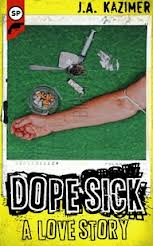 A couple of free books from me today: In Loco Parentis UK and US and Mr Suit UK and US They're both pretty cool. And Happy Easter everyone. Writing? Really?
A couple of free books from me today: In Loco Parentis UK and US and Mr Suit UK and US They're both pretty cool. And Happy Easter everyone. Writing? Really? I know, right? Spending your day making shit up. How can that possibly be a job? If only writing was that easy. It takes a lot of time and energy, not to mention a lot of lies. But I wouldn't want to be anything else. Okay, that's a lie too. I'd kill to be a secret agent like 007.
You have a master's degree in Forensic Psychology, so how did you go from that to working as a writer?
With a master's degree in psychology you really have three options. Option 1) Serial Killer, Option 2) Barista at your local coffee shop and since drinking too much coffee makes me want to stab someone with a swivel straw, I picked option 3) Writer.
I often regret that the worst damage I can do as a writer is give someone a paper cut. You started by writing crime fiction like The Junkie Tales Dope Sick: A Love Story and SHANK, and now you write demented fairytales. Why?
TheJunkie Tales (US) , Dope Sick: A Love Story (US) and SHANK (US) were all written right after I stopped being stupid with my life and health and went back to school. I was working on my degree and still working as a private investigator. The content and tone of all those books fit my life and mood at and around that time of transition. All three books probably reflect me as a person more than anything I’ve written since.
Now my life is very different so my writing reflects that. Plus, killing Cinderella was so oddly satisfying I had to do it again and again with other fairytale legends.
Do you have any advice for beginning writers?
Here’s the standard line: Work hard and learn your craft. Beyond that practice being a working writer. Go to conferences. Join critique groups. Learn the ins and outs of publishing. It’s not an easy road. There are over 400,000 books published a year, and that’s not including indie or ebooks books. Make your book stand out. Make yourself standout.
But don’t be dumb about it. Publishing is a very small world, and if you screw (literally and/or figuratively) a publisher/agent/editor, and everyone will know about it. And if the sex was bad, well, you might as well start teaching MFA students at your local university. What is your writing routine?
A tiny fairy sprinkles dust over my keyboard and magic happens. Or so I wish. In truth, I’m a terrible procrastinator. I write rarely, and would rather waste my day on facebook or surfing the web than writing. I can’t wait until I’m rich enough to hire a ghostwriter.
What are you writing now?
The answer to your (my) question.
How did you get published?
I sold my soul to the devil for a book deal and a bag of gummy bears.
Trust me, I have the better end of the deal.
Can I be in your next book?
Sure. Why not? I'll make sure to add you to page 57.
You work a day job? WTF? I thought all author were rich?
Yeah, right. I figured it out once and I make about 2 cents a day. Even bestselling authors don’t make the big buck you might think. They sure as hell whine like they don’t.
Well, when you get rich, will you buy me _____?
Of course. I love my fans and would do anything to keep you happy.
Now, can I borrow a couple hundred bucks?
Published on March 29, 2013 09:50



